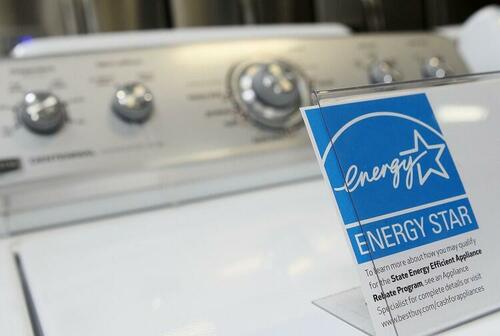
Authored by Kevin Stocklin via The Epoch Times (emphasis ours),
A pledge by the Biden administration in December 2022 to take “more than 100 actions” to impose significantly tighter environmental standards on consumer goods is now becoming reality, and consumer groups are predicting a future in which Americans pay more for products that do less, while manufacturers warn of shortages and supply chain breakdowns.
“You’re seeing, just in the last few months, new rules from the Biden administration about clothes washers, dishwashers, and other kinds of kitchen appliances, and in every case, you’re talking about a tightening of already very, very tight standards,” O.H. Skinner, executive director of the Alliance for Consumers, told The Epoch Times.
“That will make it so that nearly the majority of the current products on the market don’t meet the standards and have to be redesigned or removed from the market,” Skinner said. “Everyday things that people actually want are going to get more expensive or disappear, and the products that will be available will be more expensive but not better. People are going to wonder why life is worse.”

These new regulations (pdf) from the Department of Energy (DOE) come on top of new Environmental Protection Agency (EPA) emissions regulations on cars and electric utilities, and efforts to ban gas stoves, which critics say will have similar consequences in those industries. Many of these new regulations will be finalized by next year and would give manufacturers several years to comply.
In December 2022, the White House announced that “the Biden-Harris Administration has surpassed its goal to take 100 actions in 2022 to strengthen energy efficiency standards for a range of appliances and equipment to lower costs for American families.” The announcement touted 110 new regulations enacted by federal agencies on “everything from air conditioners and furnaces, to clothes washers and dryers, to kitchen appliances and water heaters—as well as commercial and industrial equipment.”
According to the Biden administration: “Once finalized, these standards will reduce greenhouse gas emissions by an estimated 2.4 billion metric tons, equivalent to the carbon emissions from 10 million homes, 17 million gas cars, or 21 coal-fired power plants over 30 years. The projected consumer savings from these standards would be $570 billion cumulatively, and for an average household this will mean at least $100 in annual savings.”
These actions follow a familiar pattern: rumors of new directives, followed by official denials, followed by draconian diktats. For example, reports that the Consumer Product Safety Commission would ban gas stoves over alleged safety concerns sparked a public outcry in January, which was met with denials by the Commission, together with media ridicule, that any such thing was being contemplated. This was then followed by new environmental standards from the DOE that would ban the manufacturing of 50 percent of the gas stoves available on the market today.
The DOE rules elicited criticism from House Republicans, who in a March 21 letter to Granholm called the regulations “a blatant back door attempt to ban gas appliances enjoyed by millions of Americans.
“Your attempt to ban gas appliances has no basis in law or within your jurisdiction,” GOP representatives charged. “The Department of Energy has enjoyed bipartisan support, your actions to appease the Biden Administration’s radical climate agenda does not reflect well upon the Department.”
While consumer advocates doubt that these new measures will save Americans money, appliance makers say consumers will not be happy with the products that are left to buy.
New Appliances Will Be ‘Closer to 1950s’ Than to 2020
Instead of allowing appliance manufacturers to innovate products for features that consumers want, “they are literally going to have to redesign products that will look closer to the 1950s than they do to 2020,” Association of Home Appliance Manufacturers spokesperson Jill Notini said.
Manufacturers say they have been trying to work with the DOE to moderate the new rules, citing a tradition of cooperation between agencies and industry when developing new standards, but they say they are hitting a wall with the Biden administration.
Among what one industry executive called “an avalanche” of new rules are regulations that force dishwasher and washing machine manufacturers to cut water use and energy consumption by one-third. In addition, new DOE rules would effectively eliminate 98 percent of all top-loading washing machines on the market today, would mandate that the machines be larger, and remove the central agitator that increases cleaning performance.
Manufacturers say these rules would add $200 to the cost of a washing machine, and would also halt the production of less expensive clothes dryers that don’t meet strict federal Energy Star efficiency standards. Microwave ovens are also on the list of targeted appliances.
Led by Tennessee Attorney General Jonathan Skrmetti, 21 state attorneys general wrote to DOE Secretary Jennifer Granholm on May 2 to “register their concern with the Department of Energy’s new attempt to control what appliances Americans can buy.”
“The administration’s plan to micromanage people’s choices of everyday kitchen appliances will result in fewer choices, less functionality, and higher costs for consumers,” Tennessee Attorney General Jonathan Skrmetti told The Epoch Times.
“The regulations are legally faulty because they rest on poor reasoning and shaky facts,” Skrmetti said. “This kind of bureaucratic overreach lies far outside the scope of the federal government envisioned by the Constitution.”
The AGs’ letter criticizes, among other things, the DOE’s “blind reliance” on estimates by the Interagency Working Group on the Social Costs of Greenhouse Gasses that are “fundamentally flawed and are an unreliable metric on which to base administrative action.” In addition, the AGs charge that the DOE orders violate Constitutional principles of federalism, “ignores consumers’ reactions and preferences,” and “dismisses the costs manufacturers will incur to comply with the proposed standards.”
Liberal States Join in Pushing Green Agenda
Regulations are not only coming down from federal agencies; left-leaning states are also instituting bans on internal combustion engine (ICE) vehicles, gas stoves, gas heating, and other fossil-fuel-powered products. In response to state auto emissions mandates, Stellantis, which owns the Dodge, Chrysler, and Jeep brands, said it will reduce shipments of gas-powered cars to states including California, New York, Massachusetts, Vermont, Maine, Pennsylvania Connecticut, Rhode Island, Washington, Oregon, New Jersey, Maryland, Colorado, Minnesota, Nevada, Virginia, and New Mexico in order to comply with new emissions rules in those states that seek to force consumers to switch to EVs over the next decade.
Read more here...
Authored by Kevin Stocklin via The Epoch Times (emphasis ours),
A pledge by the Biden administration in December 2022 to take “more than 100 actions” to impose significantly tighter environmental standards on consumer goods is now becoming reality, and consumer groups are predicting a future in which Americans pay more for products that do less, while manufacturers warn of shortages and supply chain breakdowns.
“You’re seeing, just in the last few months, new rules from the Biden administration about clothes washers, dishwashers, and other kinds of kitchen appliances, and in every case, you’re talking about a tightening of already very, very tight standards,” O.H. Skinner, executive director of the Alliance for Consumers, told The Epoch Times.
“That will make it so that nearly the majority of the current products on the market don’t meet the standards and have to be redesigned or removed from the market,” Skinner said. “Everyday things that people actually want are going to get more expensive or disappear, and the products that will be available will be more expensive but not better. People are going to wonder why life is worse.”

These new regulations (pdf) from the Department of Energy (DOE) come on top of new Environmental Protection Agency (EPA) emissions regulations on cars and electric utilities, and efforts to ban gas stoves, which critics say will have similar consequences in those industries. Many of these new regulations will be finalized by next year and would give manufacturers several years to comply.
In December 2022, the White House announced that “the Biden-Harris Administration has surpassed its goal to take 100 actions in 2022 to strengthen energy efficiency standards for a range of appliances and equipment to lower costs for American families.” The announcement touted 110 new regulations enacted by federal agencies on “everything from air conditioners and furnaces, to clothes washers and dryers, to kitchen appliances and water heaters—as well as commercial and industrial equipment.”
According to the Biden administration: “Once finalized, these standards will reduce greenhouse gas emissions by an estimated 2.4 billion metric tons, equivalent to the carbon emissions from 10 million homes, 17 million gas cars, or 21 coal-fired power plants over 30 years. The projected consumer savings from these standards would be $570 billion cumulatively, and for an average household this will mean at least $100 in annual savings.”
These actions follow a familiar pattern: rumors of new directives, followed by official denials, followed by draconian diktats. For example, reports that the Consumer Product Safety Commission would ban gas stoves over alleged safety concerns sparked a public outcry in January, which was met with denials by the Commission, together with media ridicule, that any such thing was being contemplated. This was then followed by new environmental standards from the DOE that would ban the manufacturing of 50 percent of the gas stoves available on the market today.
The DOE rules elicited criticism from House Republicans, who in a March 21 letter to Granholm called the regulations “a blatant back door attempt to ban gas appliances enjoyed by millions of Americans.
“Your attempt to ban gas appliances has no basis in law or within your jurisdiction,” GOP representatives charged. “The Department of Energy has enjoyed bipartisan support, your actions to appease the Biden Administration’s radical climate agenda does not reflect well upon the Department.”
While consumer advocates doubt that these new measures will save Americans money, appliance makers say consumers will not be happy with the products that are left to buy.
New Appliances Will Be ‘Closer to 1950s’ Than to 2020
Instead of allowing appliance manufacturers to innovate products for features that consumers want, “they are literally going to have to redesign products that will look closer to the 1950s than they do to 2020,” Association of Home Appliance Manufacturers spokesperson Jill Notini said.
Manufacturers say they have been trying to work with the DOE to moderate the new rules, citing a tradition of cooperation between agencies and industry when developing new standards, but they say they are hitting a wall with the Biden administration.
Among what one industry executive called “an avalanche” of new rules are regulations that force dishwasher and washing machine manufacturers to cut water use and energy consumption by one-third. In addition, new DOE rules would effectively eliminate 98 percent of all top-loading washing machines on the market today, would mandate that the machines be larger, and remove the central agitator that increases cleaning performance.
Manufacturers say these rules would add $200 to the cost of a washing machine, and would also halt the production of less expensive clothes dryers that don’t meet strict federal Energy Star efficiency standards. Microwave ovens are also on the list of targeted appliances.
Led by Tennessee Attorney General Jonathan Skrmetti, 21 state attorneys general wrote to DOE Secretary Jennifer Granholm on May 2 to “register their concern with the Department of Energy’s new attempt to control what appliances Americans can buy.”
“The administration’s plan to micromanage people’s choices of everyday kitchen appliances will result in fewer choices, less functionality, and higher costs for consumers,” Tennessee Attorney General Jonathan Skrmetti told The Epoch Times.
“The regulations are legally faulty because they rest on poor reasoning and shaky facts,” Skrmetti said. “This kind of bureaucratic overreach lies far outside the scope of the federal government envisioned by the Constitution.”
The AGs’ letter criticizes, among other things, the DOE’s “blind reliance” on estimates by the Interagency Working Group on the Social Costs of Greenhouse Gasses that are “fundamentally flawed and are an unreliable metric on which to base administrative action.” In addition, the AGs charge that the DOE orders violate Constitutional principles of federalism, “ignores consumers’ reactions and preferences,” and “dismisses the costs manufacturers will incur to comply with the proposed standards.”
Liberal States Join in Pushing Green Agenda
Regulations are not only coming down from federal agencies; left-leaning states are also instituting bans on internal combustion engine (ICE) vehicles, gas stoves, gas heating, and other fossil-fuel-powered products. In response to state auto emissions mandates, Stellantis, which owns the Dodge, Chrysler, and Jeep brands, said it will reduce shipments of gas-powered cars to states including California, New York, Massachusetts, Vermont, Maine, Pennsylvania Connecticut, Rhode Island, Washington, Oregon, New Jersey, Maryland, Colorado, Minnesota, Nevada, Virginia, and New Mexico in order to comply with new emissions rules in those states that seek to force consumers to switch to EVs over the next decade.
Read more here…
Loading…





